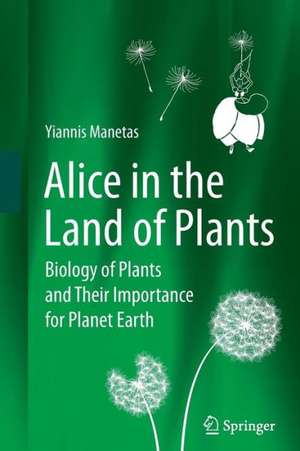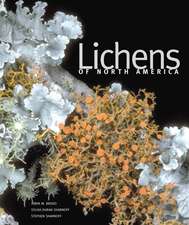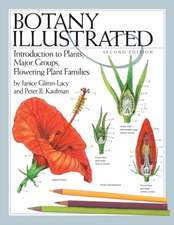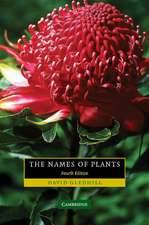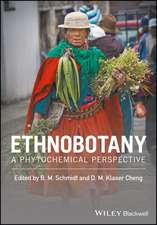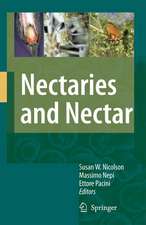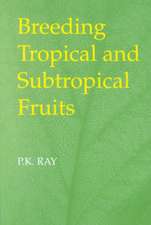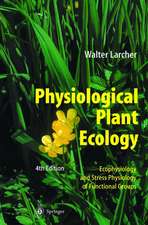Alice in the Land of Plants: Biology of Plants and Their Importance for Planet Earth
Autor Yiannis Manetasen Limba Engleză Paperback – 18 iul 2014
These are some of the questions the author discusses to demonstrate that plants are wrongly considered to be simple organisms lacking specific behaviour and intelligence. This book promises to be as pleasant a surprise as Alice’s experience in the white rabbit’s warren, in which she encountered a world very different from ours.
The author explains the biology of plants following Einstein's maxim that everything should be made as simple as possible, but not simpler.
| Toate formatele și edițiile | Preț | Express |
|---|---|---|
| Paperback (1) | 379.33 lei 38-44 zile | |
| Springer Berlin, Heidelberg – 18 iul 2014 | 379.33 lei 38-44 zile | |
| Hardback (1) | 341.76 lei 3-5 săpt. | |
| Springer Berlin, Heidelberg – 8 iun 2012 | 341.76 lei 3-5 săpt. |
Preț: 379.33 lei
Nou
Puncte Express: 569
Preț estimativ în valută:
72.59€ • 74.99$ • 60.42£
72.59€ • 74.99$ • 60.42£
Carte tipărită la comandă
Livrare economică 22-28 martie
Preluare comenzi: 021 569.72.76
Specificații
ISBN-13: 9783642432323
ISBN-10: 3642432328
Pagini: 392
Ilustrații: XVIII, 374 p.
Dimensiuni: 155 x 235 x 21 mm
Greutate: 0.55 kg
Ediția:2012
Editura: Springer Berlin, Heidelberg
Colecția Springer
Locul publicării:Berlin, Heidelberg, Germany
ISBN-10: 3642432328
Pagini: 392
Ilustrații: XVIII, 374 p.
Dimensiuni: 155 x 235 x 21 mm
Greutate: 0.55 kg
Ediția:2012
Editura: Springer Berlin, Heidelberg
Colecția Springer
Locul publicării:Berlin, Heidelberg, Germany
Public țintă
Popular/generalCuprins
Introduction: Plants are no less complex than animals – they are just different.- Basic plant organisation– how it differs from that of animals.- Why trees are almost immortal and other related issues.- Short evolutionary history of plants.- Sex in non‐motile organisms.- The world through the eyes of plants.- The defence of a stationary organism.- Symbiosis galore.- Deviations from the basic biological type.- A final word on plant intelligence.- Epilogue: Tribute to Darwin.
Recenzii
From the reviews:
“In this new book, experienced plant physiologist Manetas (Univ. of Patras, Greece) draws attention to the fascinating and complex world of plant biology. In an effort to reach a wide audience, the author writes in a more general style, with minimal specialized jargon. … Summing Up: Highly recommended. Lower-division undergraduates and general readers.” (R. B. Pratt, Choice, Vol. 50 (5), January, 2013)
“In this new book, experienced plant physiologist Manetas (Univ. of Patras, Greece) draws attention to the fascinating and complex world of plant biology. In an effort to reach a wide audience, the author writes in a more general style, with minimal specialized jargon. … Summing Up: Highly recommended. Lower-division undergraduates and general readers.” (R. B. Pratt, Choice, Vol. 50 (5), January, 2013)
Notă biografică
Yiannis Manetas was born in Athens, Greece (1947), studied natural sciences and geography at the University of Athens (1970), and received his doctorate in biological sciences from the University of Patras, Greece (1976). Since 1978, he has held several different research and teaching positions at the University of Patras, where he currently is Professor of Plant Physiology in the Department of Biology. He also has participated in research at the Universities of Goteborg (Sweden), Stirling (Scotland), and Essen and Karlsruhe (Germany), as well as at the Abisko Research Station (Swedish Lapland). His publication list includes more than 120 research papers and review articles in international journals. His current research interests concern the ecophysiology of Mediterranean plants, the role of foliar anthocyanins, and the function of nonfoliar chloroplasts.
Textul de pe ultima copertă
Why is it that plants do not need to move? How does a nonmotile organism have sex or defend itself? Why are plants asymmetric and not of a fixed size? Why are some plants virtually immortal? Why is cloning a routine matter in the plant kingdom? What is the mechanism that allows plants to exploit a practically inexhaustible extraterrestrial energy source? How do plants regulate the composition of our planet’s atmosphere, its water cycle, the cycle of matter and energy, and ultimately our climate? Why have there not been mass extinctions among plants as there have been among animals? How do plants perceive the animate and inanimate worlds? How do they communicate with one another? In the end, are plants intelligent organisms?
These are some of the questions this book addresses in an attempt to convince readers that contrary to popular – and wrong – belief, plants are not simple organisms lacking specific behaviour and intelligence and thus are unworthy of our interest. In fact, this book promises to be as pleasant a surprise as Alice’s experience in the white rabbit’s warren, in which she encountered a world very different from ours.
These are some of the questions this book addresses in an attempt to convince readers that contrary to popular – and wrong – belief, plants are not simple organisms lacking specific behaviour and intelligence and thus are unworthy of our interest. In fact, this book promises to be as pleasant a surprise as Alice’s experience in the white rabbit’s warren, in which she encountered a world very different from ours.
Caracteristici
The author invites the reader to explore the world of plants by raising interesting questions The text is ideally suited for students, teachers, and the layperson who is a science fan Marginalia such as short questions, comments, and conclusions help readers appreciate the book’s content and spirit Includes supplementary material: sn.pub/extras
